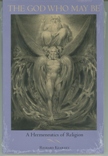 Contemporary classics revisited. In The God Who May Be: The Hermeneutics of Religion (Indiana University Press series in the philosophy of religion, 2001), Richard Kearney proposes that instead of thinking of God as "actual," circumscribed by human notions of "being" and realised temporality, God might best be thought of as something like "the coming possibility of the impossible." Through refiguring narrative-biblical perceptions of God, and breaking with dominant metaphysical-speculative traditions of religious speech, Kearney draws on the work of Paul Ricoeur, Emmanuel Levinas, Jacques Derrida, Martin Heidegger, Husserl, Lyotard, Caputo and many others. He evokes views of God as unforeseeable, unprogrammeable, and resistant to our 'rational' or 'religious' desires for certainty. Important themes such as the phenomenology of the persona, the meaning of the unity of God, performative truth, the divine and desire, notions of existence towards differance (Derrida), and fiduciary commitments in philosophy are taken up in a perceptive and stimulating book. It is part of a trilogy entitled 'Philosophy at the Limit' comprising three volumes. The others are On Stories (Routledge, 2002) and Strangers, Gods, and Monsters (Routledge, 2003). His other books include the extraordinary The Wake of Imagination: Ideas of Creativity in Western Culture (Hutchinson, Routledge, 1988). As a public intellectual in Ireland, Kearney was involved in drafting a number of proposals towards a Northern Irish peace agreement (in 1983, 1993 and 1995) and in speechwriting for the former Irish President, Mary Robinson, who went on to become the UN human rights commissioner.
Contemporary classics revisited. In The God Who May Be: The Hermeneutics of Religion (Indiana University Press series in the philosophy of religion, 2001), Richard Kearney proposes that instead of thinking of God as "actual," circumscribed by human notions of "being" and realised temporality, God might best be thought of as something like "the coming possibility of the impossible." Through refiguring narrative-biblical perceptions of God, and breaking with dominant metaphysical-speculative traditions of religious speech, Kearney draws on the work of Paul Ricoeur, Emmanuel Levinas, Jacques Derrida, Martin Heidegger, Husserl, Lyotard, Caputo and many others. He evokes views of God as unforeseeable, unprogrammeable, and resistant to our 'rational' or 'religious' desires for certainty. Important themes such as the phenomenology of the persona, the meaning of the unity of God, performative truth, the divine and desire, notions of existence towards differance (Derrida), and fiduciary commitments in philosophy are taken up in a perceptive and stimulating book. It is part of a trilogy entitled 'Philosophy at the Limit' comprising three volumes. The others are On Stories (Routledge, 2002) and Strangers, Gods, and Monsters (Routledge, 2003). His other books include the extraordinary The Wake of Imagination: Ideas of Creativity in Western Culture (Hutchinson, Routledge, 1988). As a public intellectual in Ireland, Kearney was involved in drafting a number of proposals towards a Northern Irish peace agreement (in 1983, 1993 and 1995) and in speechwriting for the former Irish President, Mary Robinson, who went on to become the UN human rights commissioner.Comment on this post: FaithInSociety

No comments:
Post a Comment